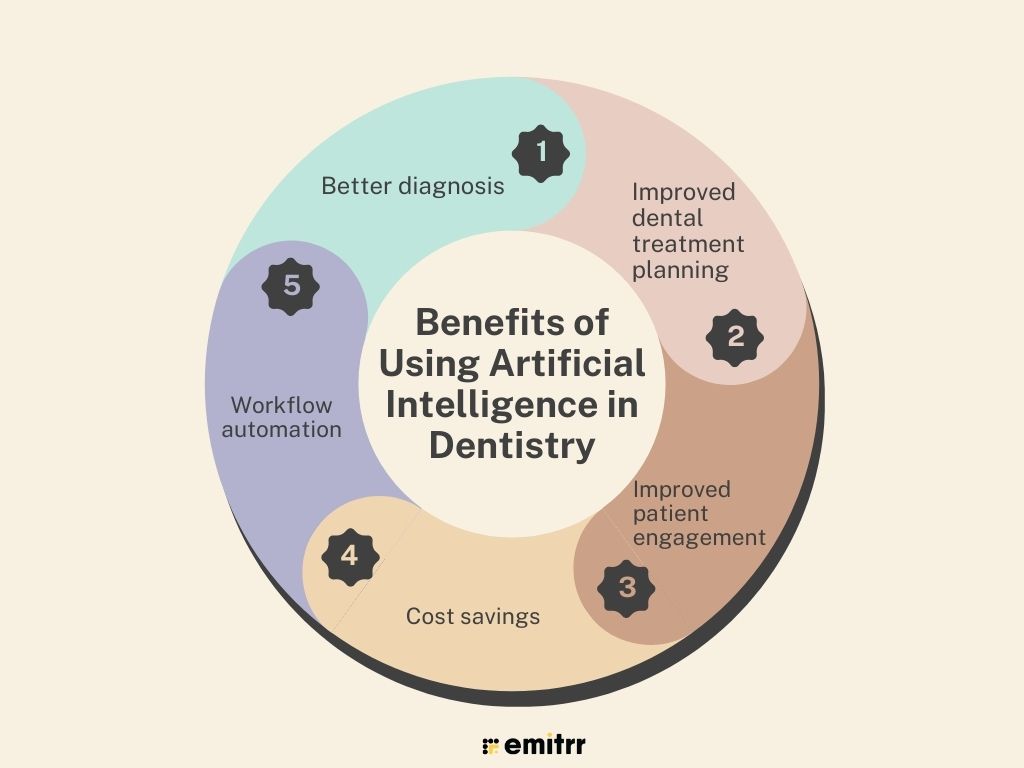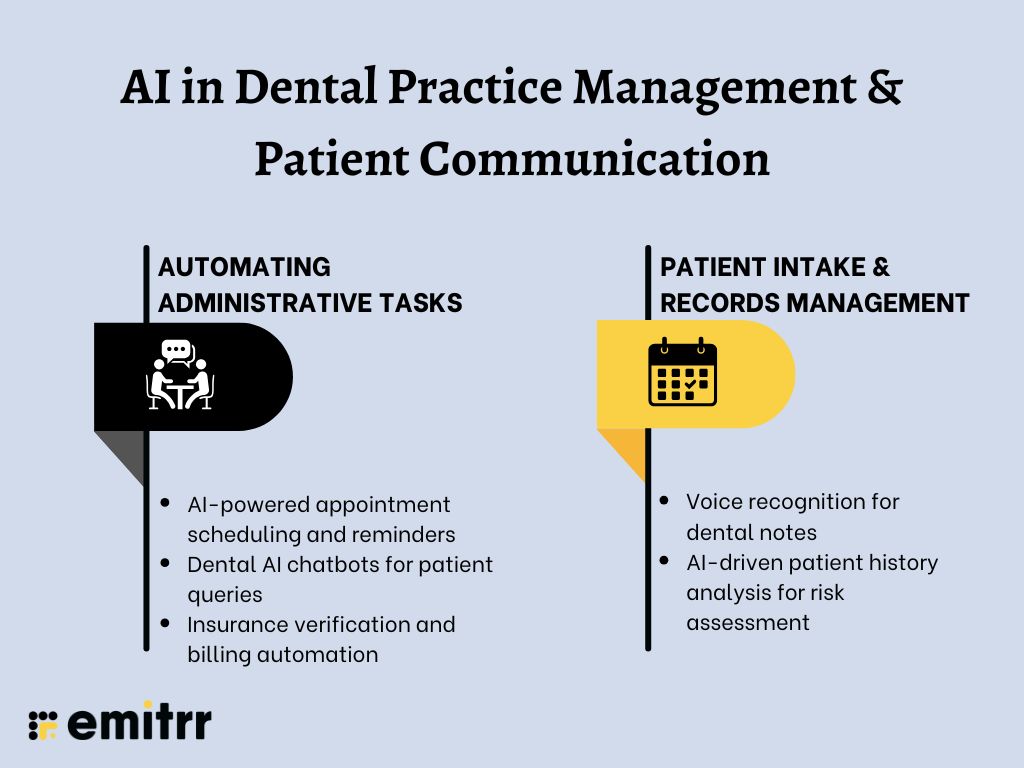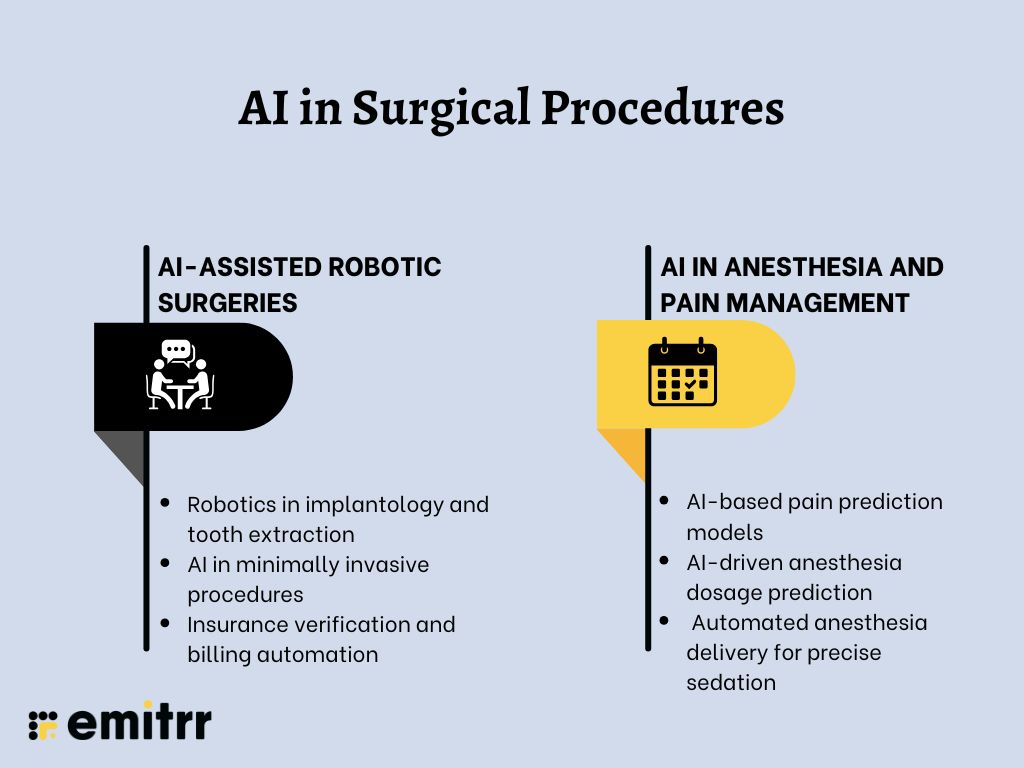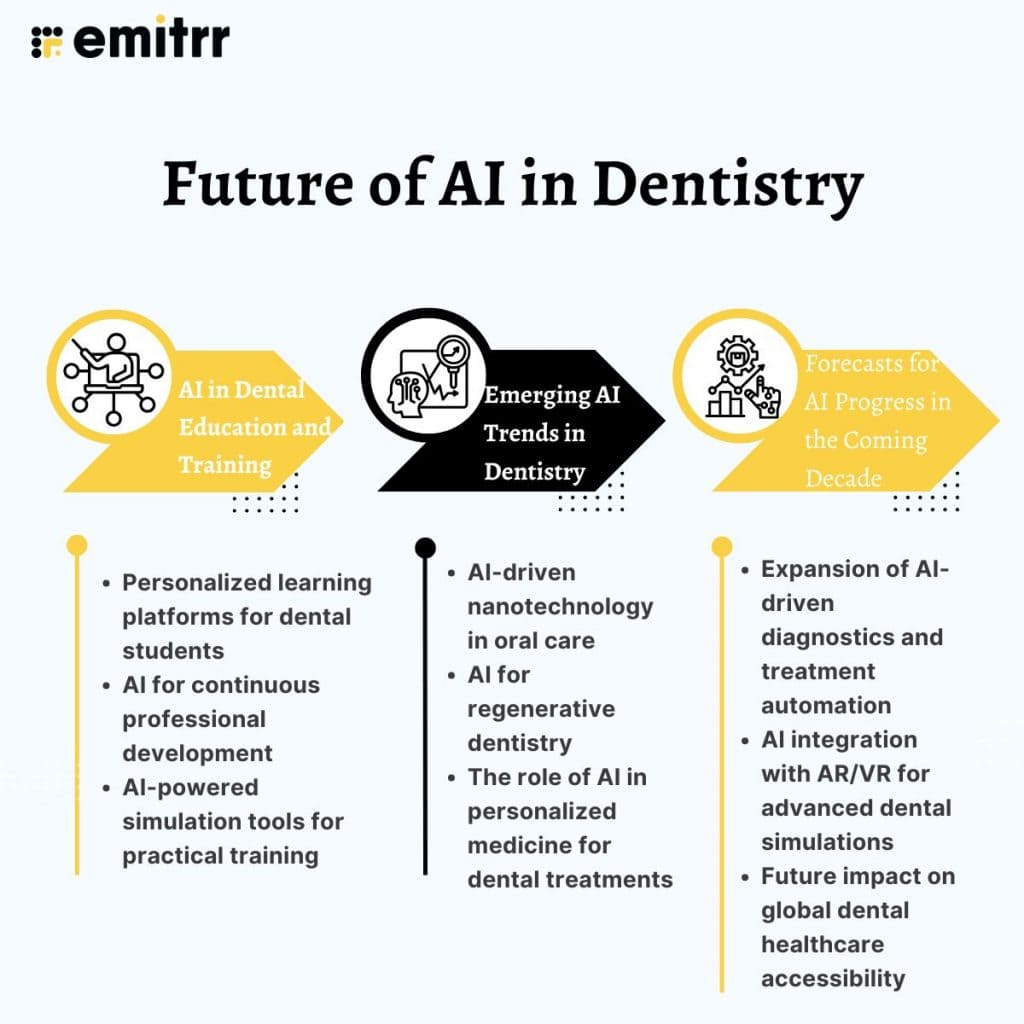Introduction to AI for Dentistry
Artificial Intelligence (AI) is transforming dentistry by improving accuracy, efficiency, and patient care. Through machine learning, deep learning, and automation, AI is transforming radiographic analysis, optimizing administrative workflows, and enabling personalized treatment planning.
This blog serves as a comprehensive guide for dental professionals, practice managers, and researchers looking to understand how AI-powered solutions like Emitrr are revolutionizing patient management, diagnostics, dental treatment planning, and research.
What is AI for Dentistry?
AI in the field of dentistry is being used popularly for simplifying dental diagnosis, offering personalized treatment planning, and improving overall dental patient care. AI-powered tools can provide more accurate diagnoses, they can reduce front-desk work, cut no-show rates, simulate treatment outcomes, and improve overall patient experience with your dental clinic.
Artificial intelligence for dentists has many use cases; you could use it for diagnosis, surgeries, patient communication, treatment planning, post-care monitoring, research, and more. We have discussed each of these use cases in detail and shared the best tools specific to your use case.
Benefits of Using Artificial Intelligence in Dentistry
There are a plethora of benefits of using artificial intelligence in dentistry, here are a few to take a look at:

- Better diagnosis: AI surpasses humans in analyzing intraoral images, CBCT, and x-ray scans to detect abnormalities, gum diseases, cavities, etc.
- Improved dental treatment planning: Using algorithms and outcomes of past procedures, dental AI can predict how orthodontic treatments will affect the patient and suggest better treatment planning. For example, dental AI can help patients visualize the outcome of using aligners or braces and even help in designing veneers, crowns, etc.
- Improved patient engagement: Dental AI tools can improve patient engagement by allowing you to send automated appointment reminders & follow-up texts, by being available 24/7, helping simplify appointment scheduling and more.
- Cost savings: Artificial intelligence in dentistry can help you save costs by reducing errors in manual entries, appointment bookings, and ensuring 24/7 availability without adding extra staff.
- Workflow automation: AI in dentistry can improve workflow automation by handling billing, paperwork work and insurance checks.
1. AI in Dental Diagnosis and Treatment Planning
Artificial Intelligence (AI) is revolutionizing dental diagnostics and treatment planning, enhancing precision and efficiency across various procedures. Here are various ways AI is utilized in diagnosis and dental treatment planning:
AI for Dental Image Analysis and Disease Detection
- AI-assisted radiograph analysis (X-rays, CT scans, MRIs)
Deep learning AI algorithms can quickly and accurately interpret dental radiographs, helping in the detection of anomalies such as impacted teeth and bone fractures. This enhances diagnostic accuracy and reduces the likelihood of missed conditions.
- Caries and cavity detection
AI systems can identify early signs of tooth decay, enabling timely interventions and potentially reversing the progression of caries.
- Early detection of oral cancer and gum diseases
Through pattern recognition in imaging and patient data, AI facilitates the early diagnosis of oral cancers and periodontal diseases, leading to improved patient outcomes. AI algorithms analyze patterns in oral tissue images, identifying subtle changes that may indicate cancerous or precancerous lesions.
Dental AI in Predictive Treatment Planning
- AI in orthodontics (aligner planning, bite analysis)
AI assists in designing personalized orthodontic treatments by analyzing bite patterns and predicting tooth movement, resulting in more effective and efficient aligner therapies.
- Personalized dental treatment recommendations
By evaluating individual patient data, including medical history and genetic information, AI can suggest tailored treatment plans, enhancing the effectiveness of dental interventions and patient satisfaction.
Notable AI Tools in Dentistry for Diagnosis & Dental Treatment Planning
- Overjet AI Dental Software
Overjet AI is an FDA-cleared AI system that enhances dental X-ray visuals with color-coded overlays, marking cavities and other issues, thereby improving diagnostic accuracy and patient communication.
- Pearl AI Dental Software
Pearl AI dental software is a popular AI dentistry tool that is used to analyze dental X-rays to identify gum issues, tooth decay, infections, etc. Dentists love Pearl AI as it acts as a second opinion and gives dentists the confidence to confirm dental issues.
If you are looking to improve dental diagnostics and treatment planning, then tools like Pearl AI and Overjet dental AI can be your best friends.

2. AI in Dental Practice Management & Patient Communication
AI is transforming dental practice management by streamlining administrative workflows, enhancing patient interactions, and optimizing operational efficiency. By automating routine tasks, AI enables dental professionals to focus more on patient care and less on paperwork. AI helps to improve operational efficiency by reducing patient wait times and increasing appointment throughput. Here are the main areas where AI improves dental practice management:

Automating Administrative Tasks
- AI-powered appointment scheduling and reminders
AI-driven systems help automate appointment bookings, send reminders via SMS/email, and reduce no-shows by optimizing scheduling efficiency.
- Dental AI chatbots for patient queries
AI-powered chatbots, like those integrated into platforms such as Emitrr, handle appointment inquiries, FAQs, and follow-ups, providing instant support to patients 24/7.
- Insurance verification and billing automation
AI streamlines insurance eligibility checks and automates billing processes, reducing claim denials and administrative workload. AI can use Optical character recognition to extract insurance information from patient cards, and then cross-check it with online insurance databases.
AI in Patient Intake & Records Management
- Voice recognition for dental notes
AI-powered speech-to-text tools allow dentists to dictate notes, reducing documentation time while ensuring accurate record-keeping.
- AI-driven patient history analysis for risk assessment
AI analyzes patient medical histories to assess risk factors for conditions like gum disease, cavities, and oral cancer, enabling proactive care.
Notable AI tool for Dental Patient Communication & Practice Management
- Emitrr
Emitrr is an AI-powered patient communication software for dentists. Its core offerings include a 24/7 AI receptionist, a dental VoIP system, an AI chatbot, a smart scheduling tool, automated reminders, two-way texting and more.
Using this AI dental software, you can:
- Answer calls, book appointments, and handle FAQs 24/7 without extra staff
- Automate dental appointment reminders to save time and reduce no-shows
- Fill last minute cancelled or rescheduled slots without manual efforts
- Automate pre and post-dental care instruction messages
- and more!
If you are looking to integrate AI in dentistry for simplifying patient communication, then you should definitely book a free demo call with Emitrr today.
Recommended for watching:
3. AI in Prosthodontics and Restorative Dentistry
Artificial Intelligence (AI) is revolutionizing prosthodontics and restorative dentistry by enhancing diagnostic accuracy, improving treatment planning, and streamlining clinical workflows. Its integration into dental practices leads to more precise, efficient, and personalized patient care. Here’s how AI is transforming prosthodontics and restorative dentistry:
AI in Digital Smile Design
- AI-based smile simulations
AI algorithms analyze facial features, using facial recognition and dental structures to create realistic smile simulations, aiding patients in visualizing potential outcomes before treatment.
- Personalized treatment planning for cosmetic dentistry
AI assists in designing customized treatment plans by predicting optimal aesthetic and functional results, considering individual patient anatomy and preferences.
AI in 3D Printing and Prosthodontics
- AI-assisted crown, bridge, and denture design
AI facilitates the design of dental prostheses by automating the creation of crowns, bridges, and dentures, ensuring precise fit and function. AI is also being used to determine the best materials to use for prosthetics.
- AI in implantology (precise placement planning)
AI for dentists aids in planning the accurate placement of dental implants by analyzing bone structures and simulating surgical procedures, reducing risks and improving outcomes.
Notable AI Tools in Prosthodontics
- CAD/CAM Systems
AI-enhanced computer-aided design and computer-aided manufacturing systems streamline the design and fabrication of dental restorations, increasing efficiency and accuracy. AI-driven automation optimizes designs, and AI-powered error detection improves fabrication
By embracing AI technologies, prosthodontics and restorative dentistry are advancing toward more accurate diagnostics, efficient treatment processes, and improved patient satisfaction.
4. AI in Surgical Procedures
Artificial Intelligence (AI) is transforming dental surgeries by improving precision, reducing human error, and enhancing patient safety. From robotic-assisted implant placements to AI-driven anesthesia management, these technologies are streamlining complex dental procedures, ensuring better clinical outcomes and faster recovery times. Below are the key areas where AI is making an impact in surgical procedures:

AI-Assisted Robotic Surgeries
Robotics in implantology and tooth extraction
- AI-powered robotic systems assist in precise implant placement and extractions, minimizing surgical risks and improving procedural accuracy.
- Systems like Yomi, the first FDA-cleared robotic dental surgery assistant, enhance precision in implant placements by providing real-time haptic feedback, allowing the surgeon to feel the tissues as if they were doing the procedure manually.
AI in minimally invasive procedures
- AI for dentists enables guided surgeries with minimal tissue damage, reducing post-surgical discomfort and recovery time. Machine learning models analyze patient-specific factors and integrate them with 3D imaging to recommend the least invasive surgical approaches.
- AI can also be used to create virtual surgical simulations before the actual procedure.
AI in Anesthesia and Pain Management
AI-based pain prediction models
- AI assesses patient history and procedural factors to predict pain levels and recommend preemptive pain management strategies.
- Machine learning algorithms personalize pain control by considering real-time physiological data.
AI-driven anesthesia dosage prediction
- AI for dentists analyzes biometric data to optimize anesthesia dosages, reducing risks of over- or under-sedation.
- AI-driven anesthesia systems adjust sedation levels dynamically based on patient responses during surgery.
Automated anesthesia delivery for precise sedation
- AI-integrated systems control drug infusion rates, ensuring stable sedation throughout procedures.
- Robotic anesthesia assistants reduce the need for manual intervention, enhancing patient safety.
Notable AI Tools in Dental Surgery
- Yomi (Neocis): AI-assisted robotic system for guided implant placement.
- Navident: AI-driven dynamic navigation for precise surgical planning and execution.
- Emitrr: AI-powered patient communication for post-op care reminders and follow-up scheduling.
AI in dental surgery is revolutionizing precision, safety, and patient outcomes. With continued advancements, these technologies will become essential tools in modern dental practices, making surgeries more efficient and minimally invasive
5. AI in Post-Treatment Care & Patient Monitoring
Artificial intelligence (AI) is revolutionizing post-treatment dental care and patient monitoring by enhancing tele-dentistry services and providing personalized oral hygiene recommendations. These advancements lead to improved patient outcomes and more efficient dental practice management. Following are the key ways AI is enhancing post-treatment care and monitoring:
AI in Tele-Dentistry & Remote Monitoring
- AI-based virtual consultations
Dental AI software facilitates remote dental consultations, allowing patients to receive timely advice without visiting the clinic. This approach increases accessibility and convenience for patients.
- Remote monitoring of treatment progress using AI-powered apps
AI for dentists enable continuous monitoring of patients’ oral health, allowing dentists to track healing, monitor gum inflammation through patient-provided pictures, and identify potential issues early through patient-reported outcome questionnaires, reducing the need for frequent in-person visits.
AI for Personalized Oral Hygiene Recommendations
- Smart toothbrushes with AI-driven feedback
Equipped with sensors and AI algorithms, smart toothbrushes analyze brushing patterns and provide real-time feedback, helping users improve their oral hygiene practices.
- AI-generated personalized oral care plans
AI systems assess individual risk factors and oral health data, including medical history, genetic predispositions, and lifestyle factors, to create customized oral care plans, promoting better long-term dental health.
Notable AI Tools in Post-Treatment Care
- Emitrr: Emitrr offers AI-powered patient communication solutions, including automated post-operative instruction delivery, follow-up messages, and feedback collection on patient recovery, enhancing patient engagement and compliance.
Integrating AI into post-treatment care and patient monitoring not only enhances the quality of dental care but also streamlines practice operations, leading to increased patient satisfaction and improved oral health outcomes.
6. AI in Dental Research and Drug Development
Artificial intelligence (AI) is transforming dental research and drug development by accelerating the discovery of innovative materials and therapies, thereby enhancing patient care and outcomes. Below are the key ways AI is transforming dental research and drug development:
AI for Dental Material Innovation
- AI predicting new materials for restorations and implants
AI for dentistry is being utilized to identify and develop novel biomaterials for dental restorations and implants. AI-driven research improves the strength, longevity, and compatibility of dental materials.
- AI-researched biocompatible composites, smart polymers, and AI-optimized ceramics
AI diagnostic dental tools analyze vast datasets to develop smart polymers, self-healing composites, and AI-optimized ceramics that adapt to oral environments, improving the longevity of dental restorations.
AI in Drug Discovery for Oral Health
- AI-driven research on periodontal disease treatments
Artificial intelligence in dentistry is being applied to drug discovery, helping identify potential treatments for periodontal diseases. AI-powered analysis accelerates the identification of compounds that improve oral health outcomes.
Notable AI Research Tools
- AlphaFold by DeepMind
This AI technology in dentistry helps predict protein structures, aiding in understanding oral diseases and developing targeted treatments.
- AI Platforms for Biomaterial Discovery:
Dental AI software optimizes dental network accuracy by streamlining the discovery of advanced biomaterials for prosthodontics and restorative dentistry.
With continuous advancements in AI dentistry, the future of dental artificial intelligence promises improved patient care, enhanced dental materials, and more effective treatments, revolutionizing the field of dental research and innovation.
7. AI in Enhancing Dental Patient Experience
Artificial intelligence in dentistry is transforming the way patients interact with dental professionals, improving communication, efficiency, and overall satisfaction. AI-driven tools, such as AI chatbots and dental virtual assistants, streamline patient interactions, ensuring timely responses, appointment scheduling, and real-time support. By leveraging AI technology in dentistry, clinics can enhance patient engagement, optimize workflows, and provide a more personalized experience. Key advancements include:
AI-Powered Virtual Assistant
AI chatbots for 24/7 patient support
- AI-powered chatbots, such as Emitrr, provide round-the-clock assistance, answering common patient queries, scheduling appointments, and offering real-time guidance. These AI dentistry solutions improve patient communication while reducing the workload for dental staff.
- AI diagnostic dental assistants analyze patient symptoms based on their queries and guide them toward necessary treatments.
AI-Driven Sentiment Analysis
Analyzing patient feedback to improve services
- AI for dentistry utilizes sentiment analysis to assess patient reviews and feedback, identifying trends in patient satisfaction and areas needing improvement. AI technology in dentistry helps clinics optimize their services based on data-driven insights.
- Dental artificial intelligence tools analyze social media reviews and online ratings, detecting sentiment patterns to enhance the patient experience.
Notable AI Tools for Patient Experience
- Emitrr
A leading AI-powered virtual assistant and patient communication software, Emitrr automates appointment reminders, patient follow-ups, and feedback collection to improve engagement and satisfaction.
- Dental AI Chatbots
AI chatbots integrated into dental patient communication software streamline interactions, reducing wait times and ensuring accurate responses to patient concerns.
- AI Sentiment Analysis Platforms
These dental AI software monitor patient communication and online reviews, helping dental practices improve their reputation and service quality.
AI dentistry solutions are redefining patient interactions by automating communication, enhancing feedback analysis, and personalized care. As artificial intelligence in dentistry continues to evolve, clinics can expect improved efficiency and patient satisfaction through AI-powered innovations.
Challenges, Risks & Ethical Considerations of AI in Dentistry
Integrating artificial intelligence into dentistry offers numerous benefits, but it also introduces challenges and ethical considerations that must be addressed to ensure safe and equitable patient care.
Data Privacy & Security
- Patient Data Protection: AI systems in dentistry rely on extensive patient data, including medical histories and imaging. Ensuring this data is securely stored and transmitted is crucial to maintaining patient confidentiality and complying with regulations like HIPAA.
- Anonymization Practices: Removing personal identifiers from datasets is essential to protect patient identities, especially when data is used to train AI models.
Bias in AI Algorithms
- Algorithmic Fairness: AI models trained on biased datasets may perpetuate healthcare disparities. Ensuring diverse and representative training data is vital to mitigate this risk.
- Continuous Monitoring: Regular audits of AI systems are necessary to identify and correct biases, promoting equitable treatment outcomes across diverse patient populations.
Integration with Existing Systems
- Interoperability Challenges: Incorporating AI into current dental practice management systems can be complex, requiring compatibility with existing workflows and technologies.
- Training Requirements: Dental professionals must be trained to effectively use dental AI software, ensuring they complement clinical judgment without causing disruptions.
Cost & Accessibility
- Financial Barriers: Implementing AI technologies can be costly, potentially limiting adoption in smaller practices or underserved areas.
- Equitable Access: Ensuring all patients benefit from AI advancements requires addressing disparities in technology access and affordability.
Addressing these challenges is essential for the responsible integration of AI in dentistry, ensuring that technological advancements enhance patient care without compromising ethical standards.
Future of AI in Dentistry
AI technology in dentistry is rapidly evolving, paving the way for groundbreaking advancements in education, treatment methodologies, and patient care.

The integration of artificial intelligence in dentistry is expected to enhance diagnostic precision, streamline procedures, and expand global accessibility to quality dental care. The coming decade will see AI-driven innovations redefining how dental professionals are trained and how treatments are delivered.
AI in Dental Education and Training
- AI-powered simulation tools for practical training
Virtual reality (VR) and AI-based simulators help dental students practice procedures with precision
- Personalized learning platforms for dental students
AI will tailor educational content based on individual learning needs and progress.
- AI for continuous professional development
AI-driven insights help dental professionals stay updated with the latest advancements in dentistry AI.
Emerging AI Trends in Dentistry
- AI-driven nanotechnology in oral care
AI and nanotechnology enhance preventive care with precision-based treatments, for example, AI-driven design of nanoscale drug delivery systems.
- AI for regenerative dentistry
AI can also help to drive 3D bioprinting in the creation of new dental tissues. AI will continue to help with the creation of new dental materials.
- The role of AI in personalized medicine for dental treatments
AI assists in customized treatment planning based on genetic and medical history.
AI will also help to create new preventative care strategies for patients.
Forecasts for AI Progress in the Coming Decade
- Expansion of AI-driven diagnostics and treatment automation
AI dentistry tools will become more efficient in early disease detection and treatment.
- AI integration with AR/VR for advanced dental simulations
Augmented reality (AR) and virtual reality (VR) combined with AI will revolutionize training and patient consultations.
- Future impact on global dental healthcare accessibility
AI for dentistry will make quality dental care more accessible, especially in remote and underserved areas.
With continued research and integration, artificial intelligence in dentistry will bridge gaps in accessibility, efficiency, and precision.
Emitrr: A Leading AI Dental Software
Emitrr is a powerful dental AI software designed to enhance efficiency, patient communication, and practice management in dentistry. By leveraging automation and communication tools, Emitrr automates administrative tasks, improves patient engagement, and streamlines workflows, making it an essential dental AI software for modern dental practices.
Key Features of Emitrr in AI-Powered Dentistry
AI in Dental Practice Management
- Automates appointment scheduling, reminders, and confirmations.
- AI chatbots assist patients with frequently asked questions about post-operative care or insurance billing, reducing manual workload.
- Seamless integration with common EHR systems for efficient data management and automated data transfer.
Enhancing Patient Experience with AI
- AI-powered virtual assistants handle patient inquiries and booking requests.
- Automated personalized dental patient follow-ups and dental recall systems ensure better retention.
- Personalized communication based on dental patient history.
AI in Post-Treatment Care & Remote Monitoring
- Automates follow-up messages, reducing patient drop-offs.
- AI-driven reminders for oral hygiene routines and post-treatment care.
- Smart patient communication tools that improve engagement and adherence to treatments.
Why Emitrr Stands Out
- Emitrr has been shown to reduce no-shows and cancellations through automated reminders by 90 percent.
- Saves time and enhances operational efficiency for dental practitioners.
- Provides a seamless, AI-powered patient experience that boosts satisfaction and retention.
Emitrr is an innovative dental AI software that transforms how dental clinics operate, making patient management smoother and more efficient. With AI-driven automation, chatbots, and communication tools, Emitrr is optimizing workflows and improving patient interactions
Frequently Asked Questions
AI in dentistry is used for diagnostic imaging, treatment planning, patient communication, dental practice management, and post-treatment care. AI-powered tools assist in detecting cavities, predicting treatment outcomes, automating administrative tasks, and enhancing patient engagement through chatbots and virtual assistants.
No, AI will not replace dentists but will assist them in making more accurate diagnoses, improving efficiency, and automating routine tasks. AI enhances decision-making and patient care but cannot replace human expertise, critical thinking, and the personal touch required in dental treatments.
Examples of AI in dentistry include:
– Dental AI for diagnostics (radiograph analysis, caries detection)
– AI-powered practice management (Emitrr for appointment scheduling and reminders)
– AI-driven prosthodontics (smile simulations, 3D printing of dental implants)
– AI chatbots for patient communication (automating queries and follow-ups)
– AI for dental research, used to discover new materials and drugs.
Yes, AI in dentistry is developed based on extensive data and research, making it highly reliable for diagnosis and treatment planning. However, like any technology, it requires continuous monitoring, human oversight, updates, and validation by dental professionals to ensure accuracy and safety. It is also important that ethical considerations, such as data privacy, and algorithm bias, are addressed.
AI improves patient experience by offering 24/7 virtual assistance, automating appointment reminders, providing personalized treatment recommendations, and enabling remote monitoring. AI-driven sentiment analysis also helps clinics enhance service quality based on patient feedback.
Conclusion
Artificial intelligence is transforming dentistry by improving diagnostics, treatment planning, and patient care. From AI-powered imaging to robotic-assisted surgeries, it is making dental care more efficient, precise, and accessible. As AI advances, innovations like tele-dentistry and regenerative treatments will further transform the industry. While challenges like data privacy and system integration remain, the benefits far outweigh the risks.
Emitrr is leading this transformation, streamlining dental practice management and patient communication with AI-driven solutions.
Book your demo today and experience the future of AI-powered dentistry firsthand!

 4.9 (400+
reviews)
4.9 (400+
reviews)
